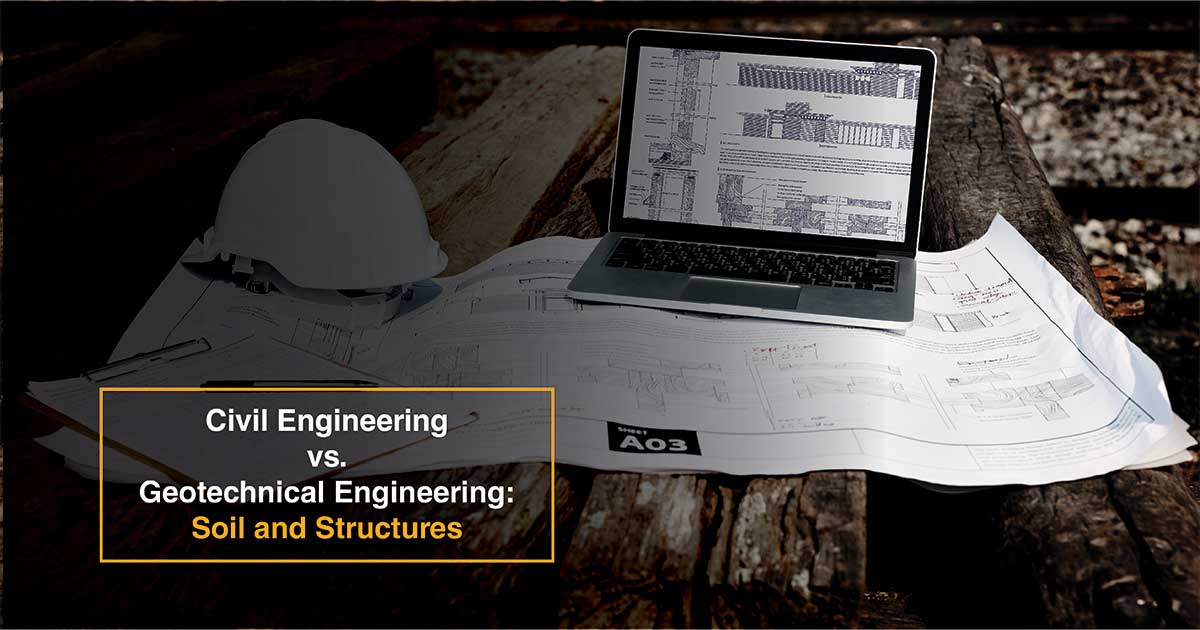FET Blogs


FET Blogs



29 April 2024
Civil engineering is concerned with planning, designing, and supervising the construction and maintenance of building and infrastructure projects. Civil engineers are responsible for every man-made infrastructure development, including roads, dams, bridges, buildings, airports and seaports. Geotechnical engineering is a branch of civil engineering that studies the properties of soil and rock to recommend foundation design. This article will look into the various courses and opportunities in the two fields.
The various courses available in Civil Engineering are -
|
Course |
Name |
Duration |
Eligibility |
|
Diploma |
Civil Engineering |
3 years |
Completed 10th grade |
|
B.Tech/ B.E. |
Civil Engineering |
4 years |
Completed 12h grade with Physics, Chemistry and Maths as primary subjects and entrance exam |
|
M.Tech/M.E. |
Civil Engineering |
2 years |
B.E./B.Tech and GATE |
|
PhD. |
|
3-6 years |
MTech |
Since it is a branch of civil engineering, Geotechnical engineering is offered as a specialisation in M. Tech. Learners can study it further as a super-specialisation by pursuing a Ph.D. To qualify for the M. Tech programme, a candidate must complete B. Tech/ B.E. from a recognised institute in any relevant field with a 50% aggregate score. They have to take an entrance exam.
The syllabus for Civil Engineering will cover subjects such as -
| Course | Syllabus |
| B.E./ B.Tech | Chemistry, Mechanics, Electronics, Engineering Drawing and Graphics, Programming and Data Structure, Hydraulics, Water and Waste Water Engineering, Solid Mechanics, Foundation Engineering, Design of RC structures, Design of Steel Structures, Construction Management, Environmental Engineering, Reinforced Concrete Design, Reinforced Cement Concrete |
| M.E./ M.Tech (Specialisations) | Construction Engineering, Coastal and Ocean Engineering, Geotechnical Engineering, Fire Protection Engineering, Structural Engineering, General Engineering, Bridge Engineering, Irrigation Engineering, Land Development, Materials Engineering, Transportation Engineering, Urban Engineering, Hydraulic Engineering, Water Resources Engineering, Environmental Engineering |
The Civil Engineering course has classroom lectures, laboratory experiments, field visits, and workshop time. Learners have to take written exams, viva voce, and do projects, and internships in the programme.
The syllabus for the Geotechnical Engineering programme includes topics such as -
| Main Course | Electives |
| Engineering Behaviour of Soils, Earthquake Engineering and Soil Dynamics, Design of Foundations, Embankments and Earth Structures, Geotechnical Foundation Design, Rock Mechanics and Tunnelling, Soil and Site Improvement, Introduction to Geographic Information Systems, Construction Equipment Management, Advanced Soil Mechanics, Theory of Plasticity, Physio-Chemical Behaviour of Soils, Ground Water Hydrology and Sampling |
|
The course will involve classroom lectures, laboratory work, and fieldwork. Students will take semester exams and submit projects and one internship for the duration of the course. They also have to write a mandatory dissertation.
Depending on the specialisation they choose, on course completion a civil engineer will work on real estate development projects, and large construction companies for roads, bridges, dams, or tunnels. They can find roles with the public works department or with the sanitation department in government or non-government organisations. Civil engineers also collaborate with architecture and interior design firms, waste management businesses, designing transportation systems, irrigation methods, and space research and exploration projects. They will be hired in roles such as -
Geotechnical engineers study geology, geomechanics (rock mechanics and soil mechanics), the design of foundations, the stabilisation of slopes, the improvement of ground conditions, the excavation of tunnels and underground openings, the analysis of ground behaviour, and the assessment of ground movements. The roles they generally work in are -
There are ample opportunities for Civil and Geotechnical engineering graduates to work with top organisations in the public and private sectors which will involve exciting fieldwork, research, and application of their learning in infrastructure projects. Civil engineers can build a super-specialist role with their Geotechnical engineering Master’s to become expert consultants and work across industries on various projects.
A1: Geotechnical engineering is a strong career for infrastructure and environmental projects.
A2: Yes, civil engineers can specialise in geotechnical engineering with further study.
A3: Geotechnical engineering is often the hardest due to complex soil analyses.
A4: Structural or geotechnical engineering are top civil engineering specialisation.
A5: Yes, geotechnical engineers use Civil 3D for design and analysis.
Popular Post
17 February 2026
AIE Full Form
10 February 2026
AEIE Full Form
22 January 2026
AE Full Form
16 January 2026
What is Aerospace Engineering?
16 January 2026
What is Chemical Engineering?
Ask an Expert for Free